Native American Tales
Air Date: Week of December 23, 2022
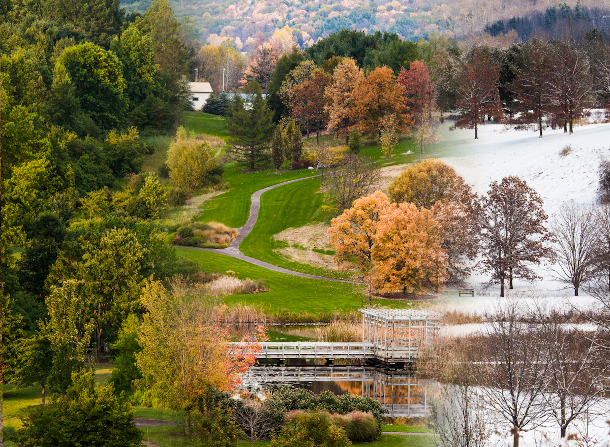
Stories of the seasons (Photo: Barbara Friedman, Flickr, CC BY-NC 2.0)
Wampanoag storyteller Medicine Story spins a tale about the shortest days of the year, and how the Wampanoag people persuaded Grandfather Sun to return. And Cherokee storyteller Gayle Ross shares seasonal tales of the importance of the warmth and the promise of spring handed down in her family.
Transcript
CURWOOD: It’s Living on Earth, I’m Steve Curwood. Our gift to you this holiday season is an old-fashioned one of some stories. They’re about earth n keeping how things came to be, and human relationships with other living things.
[Music by Medicine Story]
CURWOOD: That's the music of Medicine Story, a Wampanoag storyteller who passed away in 2018. He wrote several books, including Return to Creation and Children of the Morning Lighte. And here is his story about the darkness of winter and welcoming the sun.
ROSS: Just about now we're having the longest nights of the year. And as of the solstice, which was the 21st, then the nights will start to get shorter again and all the way until June. So we have a story to explain about that, and it explains a lot of other things, too. It's about a time when the sun didn't turn around and start to come back, but the days just kept getting shorter and shorter and shorter. And eventually they were so short that well, people would be jumping up as soon as they saw the sun come into the village. They'd jump into their clothes and run out, and the sun would already be going down and that was the end of their day. And they were very worried, because they said how are we going to grow our three sisters, the corn, beans, and squash? How are we going to go hunting and do our fishing, get our livelihood here if it's dark all the time?
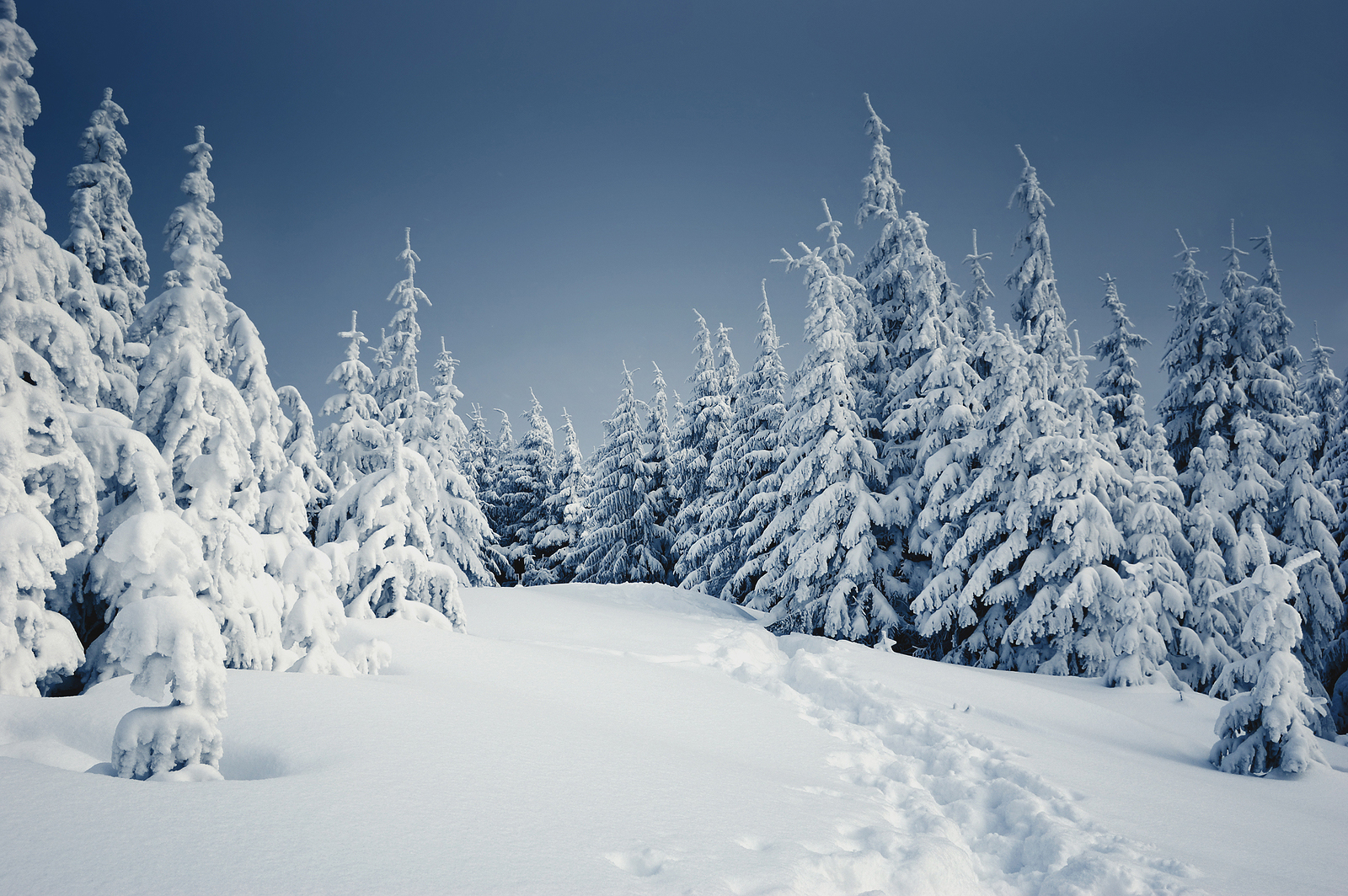
The deep snow of winter (photo: bigstockphoto.com)
Well when they spoke to their helper, first teacher Moshap, he said well I'd better go talk to Grandfather Sun and see what's wrong. And of course where we live here now, on the East Coast in order to talk to the sun in the morning you've got to go out to sea, because it comes out from the ocean out there. So he waited way far out, close to the sun coming up place. And soon as the sun popped up, he began to address and say Grandfather, you know, people are very worried you're not here very much. It's certainly good to see you today. And they began to tell their story, but unfortunately he didn't get a chance to really get into it, because the sun dropped out of sight again and it was dark. He tried that three days.
So at the end of that third try, he went down to the bottom of the ocean, began to pull out long strands of seaweed that grows way down there. And he tied them in knots and made a fish net, just as he had taught the people to make a fish net. And he made this net really big. It was a net big enough to catch the sun. And he stood out there the next time the sun was ready, and as soon as the light appeared he started swinging this net around. And he threw it just as the sun rose up, and right into the net the sun went. Moshap reached out, grabbed a-hold of the net and pulled it tight, and just held the sun right up in there.
Now the sun is struggling away, saying, "Who's doing this to me? Get this thing off of me! What's going on here?" And Moshap is holding on real tight out there, saying, "Well, I'm sorry, Grandfather, to have to do this to you. But 3 days I've been trying to talk to you and you wouldn't stop and listen. Now I'm going to hold on till you promise to listen to me." And the sun said "Oh well, all right. What is it?" And when he heard about what the people had said, he says, "You know, I think that's kind of funny, sort of peculiar, because I didn't think those people there even cared about me at all. You know, when I get there in the morning they're all asleep, and they don't even bother to come out and talk to me and thank me for that sunlight or anything. They never come to say goodbye when I go. So I just got to going shorter and shorter, because I like to spend my time on the other side of the world where there's people that really appreciate me."
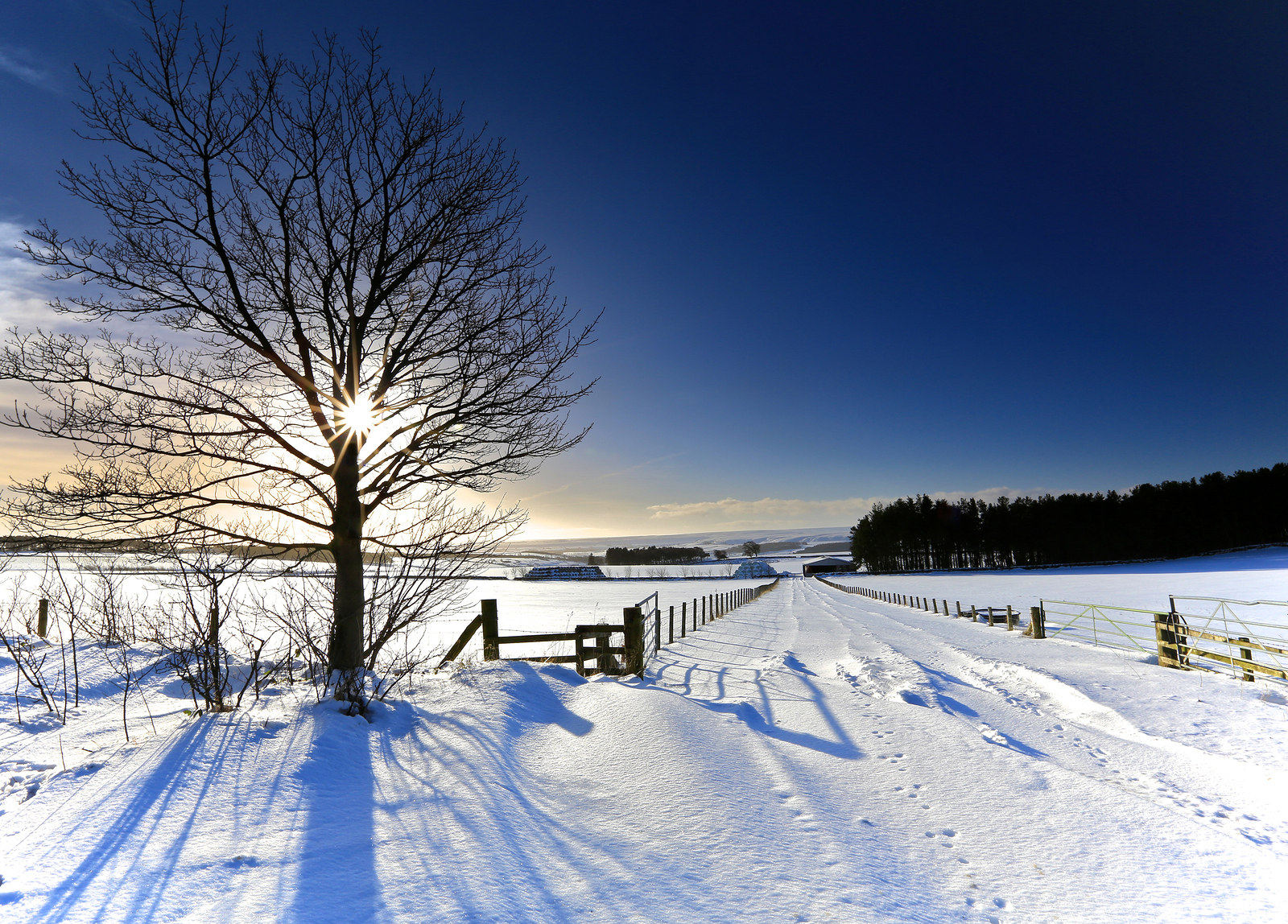
A winter landscape (photo: bigstockphoto.com)
Well, when the people heard that, they were pretty ashamed of themselves because they hadn't even considered the sun's feelings before. So the next time he came, people built a fire in the center of their village. And they were throwing tobacco in the fire, which is our way of giving thanks. Said "Thank you, Grandfather, for coming back, for giving us another day, another chance to live and learn." And all day long the people would look up and smile at him and tell him stories and gossip with him. And at the end of the day, they would gather up on the hill and all wave: "Bye, Grandfather, that was a great day you brought us! You hurry back and we'll be waiting for you!"
So the sun kind of liked that and he started to come back and the days got longer, and we got a chance to plant the corn, beans, and squash and go hunting and fishing and all that. But somewhere towards the end of June he was thinking, "Well, I kind of miss those other folks." And then he would begin to go back and spend more time over there, and our days would get shorter just as they do now. But he never, never went back to the way it was before, because we always tell this story. So it's a kind of a way of life that we have. We say all of our prayers, our prayers at Thanksgiving, because we've been given so much.
CURWOOD: Medicine Story is a wonderful name, especially for a storyteller. How did you get that name?
STORY: Well, it happened many years ago, after I had found my way into the wisdom of the elders of this continent. Traveled all around the country and learned the old ways from the old people. And I got a vision that these old ways were not just for the Indian people, that this was human being ways that had been lost by other cultures. And that it was the responsibility that was given to us to be able to let people know about these ways. And when that happened I realized that this was a big change in my life and I was going to have to be doing different things. And usually, traditionally, when you have a change like that in your direction, well you may take on a new name. And I was at a ceremony, and I had told a lot of stories, and I had talked about this change and this new path. And so that's when they gave me this name, which in my language is Manintonquat. And it means "he's telling stories of the spirit." And so in English, Medicine Story is kind of a shorthand way of saying that.
CURWOOD: Well, Medicine Story, I want to thank you for taking all this time with us. Medicine Story has 2 books. One's called Return to Creation; the other's called The Children of the Morning Light. Thanks for joining us.
STORY: As we say in our language, tabotny. Thank you.
CURWOOD: So the long dark winter can feel like it goes on forever. Gayle Ross is a Cherokee storyteller from Tahlequah, Oklahoma. Gayle, you have a tale for us of an unbearably long winter, could you please tell it now?
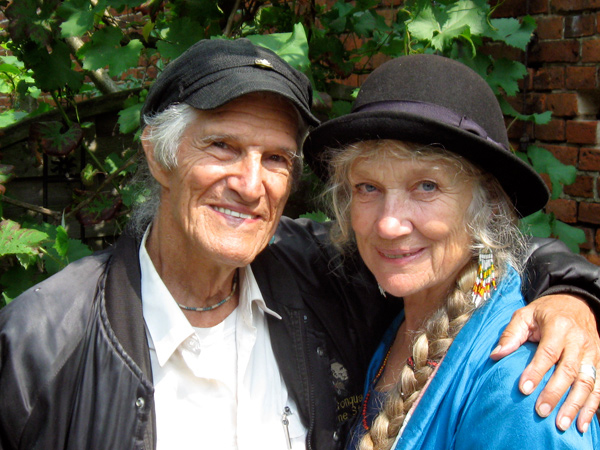
Story teller Manitonquat or Medicine Story with Ellika Linden (photo: circleway.org)
ROSS: I'd be glad to. This story is called Keeping Warmth in a Bag. It comes from the Slavi people of Canada. The Slavi people are related culturally and linguistically to our Plains people; in fact, they're one of the northernmost tribes of the Plains culture.
It seemed that long, long ago, before there were people, winter came onto the land, and then never left. The sky was hidden with these big black clouds; it snowed all the time. This went on for about 3 years, and the animal people were freezing and starving, and so they all came together in a great council.
Now after talking about it for a long time, they all agreed that spring could not come because there was no warmth in the world. Someone had taken all the warmth. And finally someone spoke up in council and they said you know, this must be hardest on our sister the bear. She has always hated the cold. Someone ask Bear if she will come and talk to us and tell us how she is doing. So all through the council people began calling for Bear, and when she did not answer, that was when they realized she was not at the council. And they realized that no one had even seen the bear since the snow and ice had started. And one wise one said well, maybe Bear has something to do with our trouble. We should go find her and find out.
And so they organized a search party to go in search of Bear. Now, Fox was chosen for his cunning, and Wolverine and Bobcat and Wolf for their fierceness and their strength. And those 4 were getting ready to walk out of the council when they heard a little voice speaking up. And they looked and it was the little Mouse. Well, the bigger, stronger animals didn't see how Mouse could be any help, but they decided she should go.
Now they searched all through this lower world. But nowhere could they find Bear. And finally they came to a great tree that lived on the Earth at that time. Its uppermost branches rested all the way against the sky and at the top branch there was an opening to the upper world. Now, none of these animals had ever been to the upper world, and they were very frightened. But Bear was nowhere in the lower world, so they thought that that must be where she had gone. So they climbed that great tree, and they squeezed through that opening in the top. And they set out to search in the upper world.
Now the first thing they noticed was that it was not snowing in the upper world, and the air was much warmer. And so they thought they might be on the right track. They wandered through the upper world until they came to a lake. And on the shores of that lake, there was a little hut there, and there were 2 little baby bear cubs playing in front of that hut.
So the animals walked up to the baby bear cubs, and they greeted them. They said, "Where is your mother?" And the bear cubs said, "She is out hunting." And they pointed across the lake. And sure enough on the other side of the lake there was a canoe beached there. Well. "We'll come in and visit with you," said Fox. "We're old friends of your mother's and we have traveled a long way to be here with you." So the little cubs led them inside the hut. And the first thing they noticed was these 4 big leather bags hanging from the poles that made the roof of the hut.
Fox pointed to those bags and said, "Now -- what are in those bags?"
"Oh -- mother keeps her treasures in there," said the cubs.
"What is in that first one?" said Fox.
"Oh, that is the one she keeps the spring rains in," said the cubs.
"Well what is in the second bag?" said the Wolverine.
"Oh, that is where the summer winds live," said the bear cubs.
Wolverine said, "And what is in that other bag? That third bag there?"
"Oh," said the bear cubs, "that's where she keeps the fogs and the mists of fall."
Then Fox pointed to the biggest bag of all and he said, "And what does she keep in that bag?"
"Oh, we can't tell you that," said the bear cubs. "Oh, that bag is the most important of all. Mother says without that bag, she couldn't keep any of the others. We cannot tell you what's in that bag."
"Oh, but we are such good friends," said Fox. "And we have journeyed so far to be with you here. You can tell us. We are your friends."
"Oh," said the bear cubs, "Mother would beat us if we told you what's in that bag."
"Oh, but she won't know," said Fox. "We won't tell on you."
"Well, in that case," said the baby bear cubs, "that is where Mother keeps the warmth. All the warmth of the world is in that bag."
"Thank you little bears," said the Mouse. "You have told us all we needed to know."
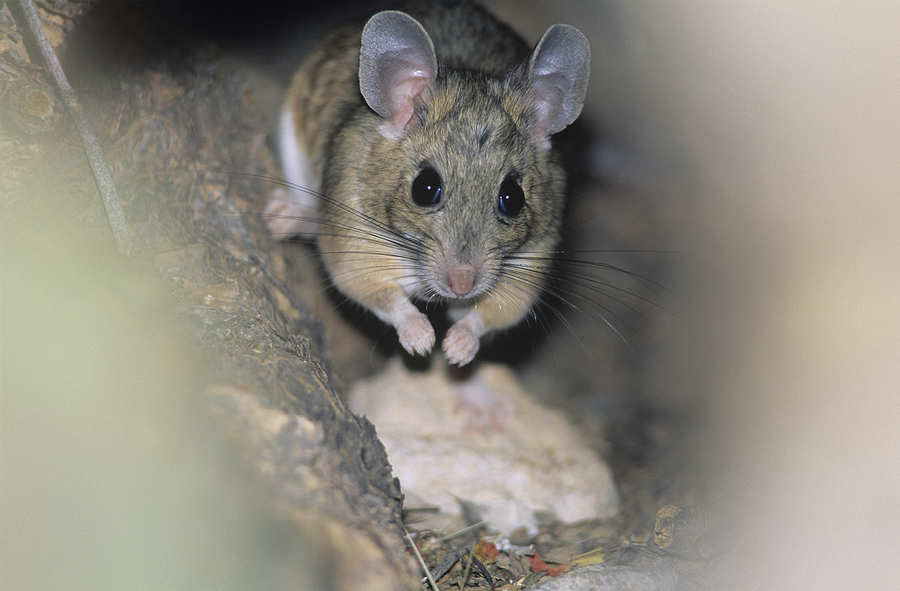
A mouse in the woodlands (photo: bigstockphoto.com)
Now they went outside and they held a council. They decided they would hide until that mother bear returned. But first, the little mouse ran all the way around the lake, jumped in that canoe and nibbled on the handle of the paddle, until she had nibbled it almost through. She came back and she hid with the others, and when they saw that mother bear coming, the Bobcat, using his magic, changed himself into a caribou calf and appeared in front of that mother bear. The mother bear called to her babies, "You stay right there, I'm bringing you caribou for dinner!" The baby bears came out of the hut and said to the others, "What did she say?"
"Oh," said Fox, "she says she needs for you to come and help her hunt that caribou for dinner. It's a good thing you have good friends here who will guard those bags while you go help your mother."
So the baby bear cubs ran off after their mother, and that bobcat caribou led them deep into the forest. The other animals hurried inside. Mouse skittered up the poles, ran out and began nibbling on the leather laces that held that bag, and that great big heavy bag holding all the warmth dropped. The other animals caught it. They dragged it outside. They looked up, they saw that bobcat caribou swimming toward them across the lake. They saw the mother bear and the babies hop in that canoe and begin paddling across that lake. But when they were in the deepest part of the lake, the paddle that Mouse had nibbled snapped, and mother bear was so surprised. She turned over that canoe and she and her babies began swimming to shore.
Now Bobcat changed back into himself, and he and all the other animals, they began pulling that heavy bag back toward that opening from the upper world to the lower world. But oh, it was heavy! One would carry it for a while and then he would have to hand it off to another. And all the time, they could hear mother bear running and yelling at them to stop. They had just reached that opening in the sky and mother bear was almost on top of them, when Mouse nibbled a hole in the bottom of that bag; they pushed it through the opening. When Bear reached out to grab that bag, she squeezed it and all the warmth squeezed out into the air of the lower world.
Well, the ice and the snow melted. The sun shone again. The trees covered themselves with leaves and the new grass grew. And finally it was spring. Now the other animals, they talked very hard to mother bear. But it was agreed that since she hated the cold so much, they would let her sleep through the winter, and so she does. She enjoys the warmth of the summer, but when the leaves change and the cold comes, mother bear, she goes to sleep and she doesn't wake up again until the spring.
CURWOOD: Well that's one naughty little bear. I suppose the story's really about greediness.
ROSS: Yeah, it's about throwing things out of balance. You know, you find examples of this kind of thinking in stories from people all across the continent. Joe Bruchac tells a wonderful story about Gloo Scabby when he was young and foolish wanting to go duck hunting. And the wind was blowing so strong he couldn't paddle into the lake. And his response was to go and capture the wind eagle, the eagle whose wings bring the winds, and tie him up. And then he discovered what a terrible place the world was with no winds blowing. But you find those kinds of stories all over, where for one selfish reason or another, one person tries to control one aspect of the natural forces and it always succeeds in throwing the entire world out of balance. I don't think we always stop to think about the balance on the earth and just how delicate it is.
CURWOOD: What a great story. And what a great storyteller. Thank you so much, Gayle Ross, for taking this time.
ROSS: Thank you.
Links
Living on Earth wants to hear from you!
Living on Earth
62 Calef Highway, Suite 212
Lee, NH 03861
Telephone: 617-287-4121
E-mail: comments@loe.org
Newsletter [Click here]
Donate to Living on Earth!
Living on Earth is an independent media program and relies entirely on contributions from listeners and institutions supporting public service. Please donate now to preserve an independent environmental voice.
NewsletterLiving on Earth offers a weekly delivery of the show's rundown to your mailbox. Sign up for our newsletter today!
 Sailors For The Sea: Be the change you want to sea.
Sailors For The Sea: Be the change you want to sea.
 The Grantham Foundation for the Protection of the Environment: Committed to protecting and improving the health of the global environment.
The Grantham Foundation for the Protection of the Environment: Committed to protecting and improving the health of the global environment.
 Contribute to Living on Earth and receive, as our gift to you, an archival print of one of Mark Seth Lender's extraordinary wildlife photographs. Follow the link to see Mark's current collection of photographs.
Contribute to Living on Earth and receive, as our gift to you, an archival print of one of Mark Seth Lender's extraordinary wildlife photographs. Follow the link to see Mark's current collection of photographs.
 Buy a signed copy of Mark Seth Lender's book Smeagull the Seagull & support Living on Earth
Buy a signed copy of Mark Seth Lender's book Smeagull the Seagull & support Living on Earth

